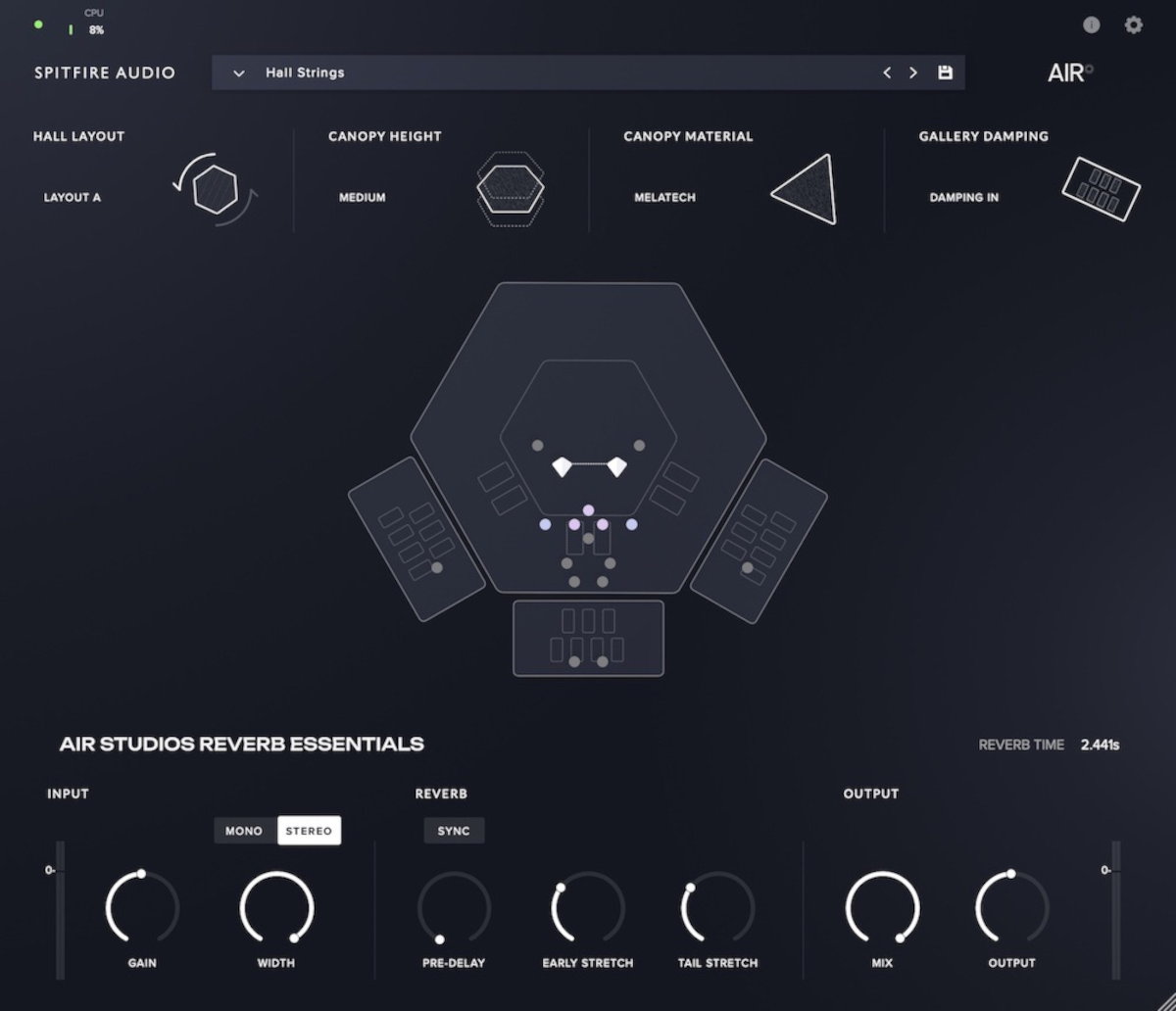LONDON, UK: following hot on the heels of its AIR STUDIOS REVERB convolution reverb released to widespread critical acclaim earlier this year as the leading sounds and sample libraries creator’s inaugural effect plug-in, Spitfire Audio is proud to present AIR STUDIOS REVERB ESSENTIALS — effectively streamlining its elder software sibling as an easy-to-use follow-up that continues to break new ground in sonic authenticity and making it available to a wider audience, again created in close collaboration with the talented team at London’s legendary AIR Studios to which it partly owes its notable name — as of November 7…

As a streamlined, easy-to-use convolution reverb effect plug-in, AIR STUDIOS REVERB ESSENTIALS is essentially anchored around 64 carefully curated presets based on real-life mixing practices catering to various instruments, moods, and setups, and to create a selection of standard reverb modes and spaces. Spitfire Audio has taken the concept of Impulse Response (IR) — itself a digital reverb effect that simulates the acoustics of a space or hardware device by using recorded impulse responses, themselves a measurement of how a space or system responds to a short sound, the resulting data from which is used to create a convolution reverb effect that can be applied to any sound or instrument — to new heights by capturing an unprecedented 67,000 IRs to recreate any position and configuration in Lyndhurst Hall — one of the world’s largest recording rooms with a live area capable of accommodating a full symphony orchestra and choir simultaneously, its inspiring acoustic adored by musicians since (pre-eminent producer of The Beatles, Oscar-nominated composer, and AIR Studios founder) Sir George Martin opened it in 1992 as a flexible space suited to film scoring, orchestral recordings, and live performances, with music recorded there heard in cinemas and homes throughout the world — within London’s legendary AIR Studios.
Saying that, though, AIR STUDIOS REVERB ESSENTIALS goes beyond traditional IRs, leveraging Spitfire Audio’s proprietary Virtual Positioning Technology (VPT) to effectively allow anyone to drag and drop their — mono or stereo — sounds and musicians anywhere within AIR Studios’ Lyndhurst Hall, capturing the precise ambience of its unique acoustic spaces. It is fair to say that when working in Lyndhurst Hall musicians traditionally face the control room, which creates a distinct reverb character, although a lesser-known, yet equally endearing, sound is achieved with musicians facing the organ — a setup synonymous with the AIR Studios-recorded scores of Hans Zimmer, arguably one of the greatest and certainly one of the most prolific film composers of our time, notable for his innovative integration of electronic sounds with traditional orchestral arrangements. As such, Spitfire Audio’s talented team mirrored microphone placements on the hall floor to recreate both of those signatures sounds within AIR STUDIOS REVERB ESSENTIALS, courtesy of its HALL LAYOUT feature that switches the orientation of the player and microphone positions in the hall, changing the characteristic of captured ambience. And combined with dedicated speaker positioning, this allows users to position their virtual sound source facing in either direction, duly capturing the essence of those renowned recordings.
Realised as a more streamlined, easy-to-use follow-up to its immensely detailed AIR STUDIOS REVERB convolution reverb effect plug-in, Spitfire Audio’s AIR STUDIOS REVERB ESSENTIALS’ UI (User Interface) readily reflects its musical mission, with an information panel positioned towards the top highlighting those hall layouts alongside associated CANOPY HEIGHT, CANOPY MATERIAL, and GALLERY DAMPENING configuration settings — all a visual reflection of whatever preset is selected — to create multiple variations of the reverb response around early reflections and reverb time. The lower panel provides easy access to INPUT — sets the intensity of the input signal and the size of the ensemble, with GAIN control and WIDTH of the source/ensemble; REVERB — augments the sound with artificial PRE-DELAY, plus EARLY STRETCH and TAIL STRETCH settings; and OUTPUT — for final tweaks to the balance between dry and wet signals (MIX) and the OUTPUT gain. It is only fitting, therefore, that the drag-and-drop nature of those amazing VPT controls dominate that UI, ultimately reflecting the years of meticulous research and development that led to AIR STUDIOS REVERB ESSENTIALS continuing to break new ground in sonic authenticity and making it available to a wider audience.
The 9.73 GB download-sized AIR STUDIOS REVERB ESSENTIALS is available as a dedicated — AAX-, AU-, VST2- and VST3-compatible — plug-in for MacOS X 11 to MacOS 14 (Apple Silicon computers supported, 64-bit DAW required) and Windows 10 or 11 (latest Service Pack, 64-bit DAW required) for £99.00 GBP (inc. VAT)/$99.00 USD/€99.00 EUR (inc. VAT) from here: https://www.spitfireaudio.com/air-studios-reverb-essentials
Spitfire Audio’s namesake Spitfire Audio app allows anyone to buy now and download anytime, and is available for free from here: http://www.spitfireaudio.com/info/library-manager/
For more in-depth information, including some superb-sounding audio demos, please visit the dedicated AIR STUDIOS REVERB ESSENTIALS webpage here: https://www.spitfireaudio.com/air-studios-reverb-essentials
Watch Spitfire Audio’s premiere of AIR STUDIOS REVERB ESSENTIALS — including its tempting trailer and a welcomed walkthrough with company co-founder Paul Thomson — here: https://youtu.be/0iPnKeDTBt8
